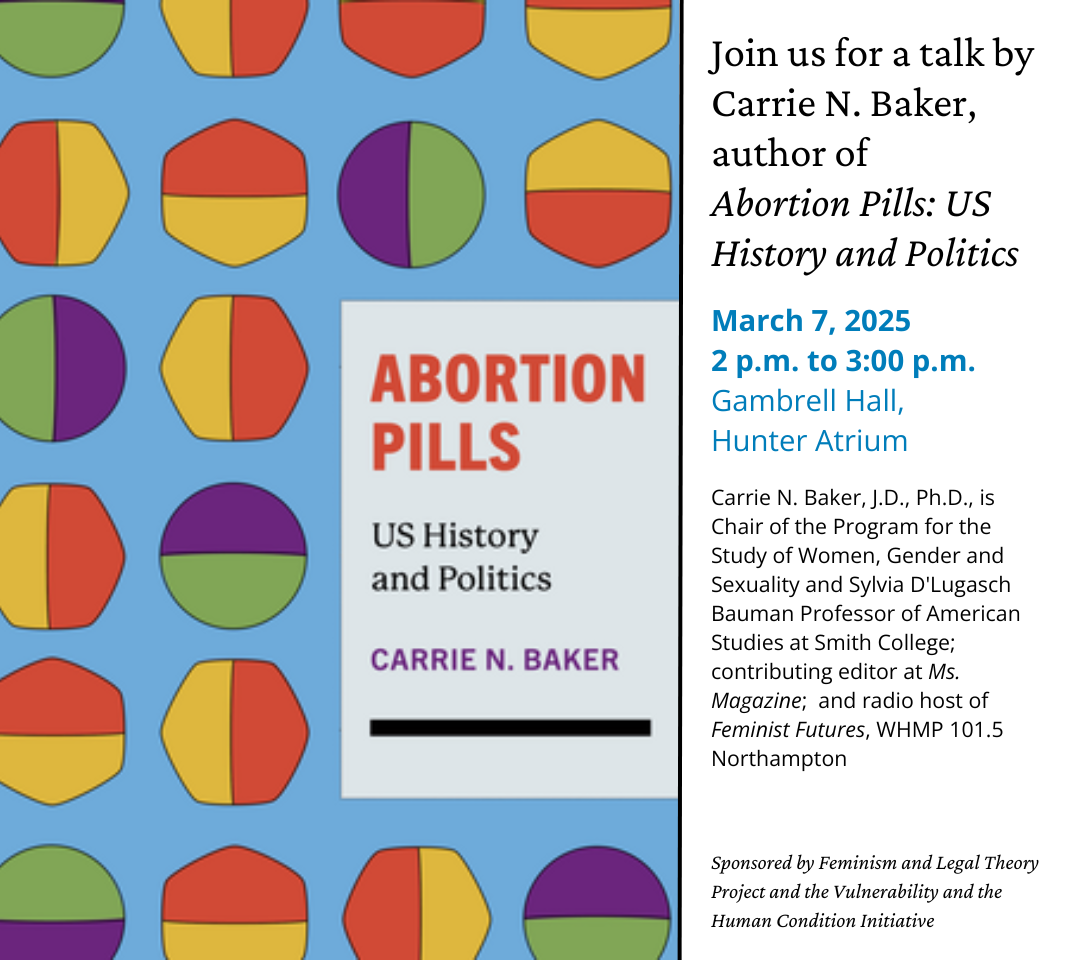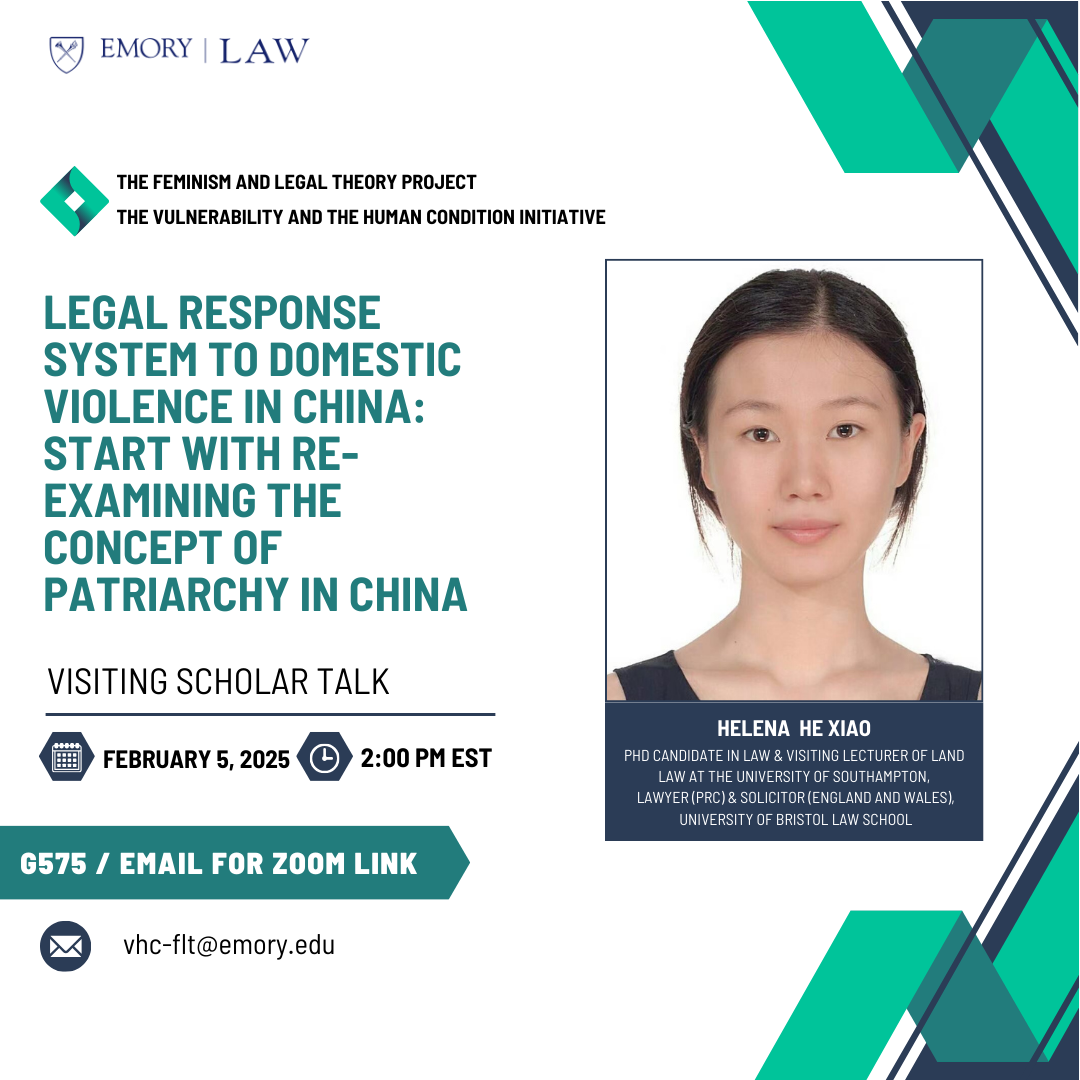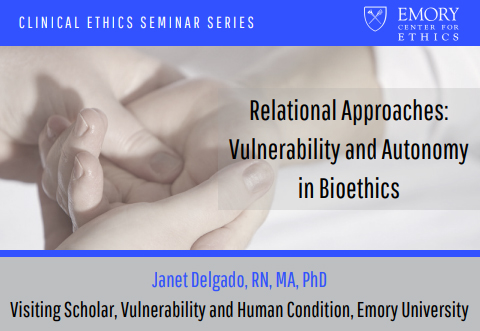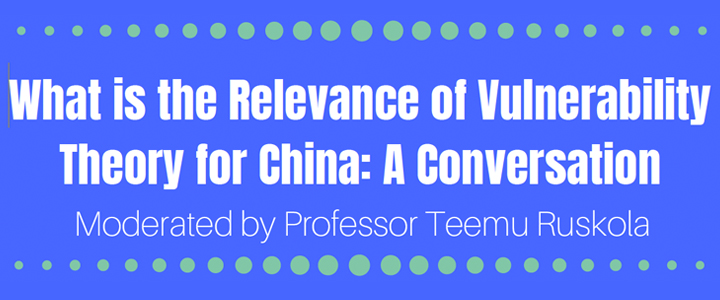News and Events
During this talk, Dr. Kate O’Reilly will explore the contradictions in EU sustainability law using the Right to Repair as a case study. Taking the ordoliberal foundations of the EU supranational legal order as my starting point, O’Reilly will position the Right to Repair Directive (RRD), as both a consumer law and sustainability measure, in the (neo)liberal economic constitution of the EU’s social market economy. Through vulnerability theory, the RRD can be framed not as a step towards circularity but as a reinforcement of the inequalities and market-based governance structures that undermine the EU’s commitment to a just transition for a sustainable Europe. O’Reilly plans to think further on the insights that vulnerability theory can bring on the institutional structure of dependency in the EU order and on the creation of an EU society around the collective interests of two social groups: consumers and workers.

Carrie N. Baker, J.D., Ph.D., is Chair of the Program for the Study of Women, Gender and Sexuality and Sylvia D'Lugasch Bauman Professor of American Studies at Smith College, contributing editor at MS. Magazine, and radio host of Feminist Futures, WHMP 101.5 Northampton. Sponsored by the Feminism and Legal Theory Project and the Vulnerability and the Human Condition Initiative

The Feminism and Legal Theory Project and the The Vulnerability And The Human Condition Initiative Present: Legal Response System to Domestic Violence in China: Start With Re-Examining the Concept of Patriarchy in China featuring Helena He Xiao, PhD Candidate in Law and Visiting Lecturer of Land Law at The University Of Southampton, Lawyer (Prc) and Solicitor (England And Wales), University of Bristol Law School
Our first workshop this summer will look at how the Feminism and Legal Theory Project grew from the need to integrate feminist theory into law during the 70s and 80s, considering the directions FLT has taken, as well as possible directions forward. The broad topic will be “Looking Backward — The History of the Feminism and Legal Theory Project in Context: Innovation, Assimilation, Appropriation, and Coverture. 2pm-3:30pm EST, June 28, 2023. The second will consider the contemporary Feminist Judgment Project, comparing approaches and methodologies and considering what might be the focus of and aspirations for feminist legal theory in the future. 2pm-3:30pm EST, August 8, 2023. Save the dates for our virtual workshops and look for a call for papers in future editions of the VHC Digest. Please contact us if you have ideas for these workshops at vhc-flt@emory.edu.
"Protection Policies for Children in China: A Vulnerability Analysis" Dr. Sophie Wang will present her research at 2:00pm on Thursday, June 8th at the Center for International and Comparative Law. Dr. Wang writes that her research centers on analyzing Chinese legislation and policies regarding “vulnerable children.” By tracing the development of these laws and policies since 2015, Dr. Wang examines the progress and shortcomings of state responsibilities through the lens of Vulnerability Theory, exploring how Vulnerability Theory could provide a new paradigm for supporting “vulnerable children” and their families in the "vulnerable state." Email vhc-flt@emory.edu to attend via Zoom.
The Feminism and Legal Theory Project and the making of Critical Legal Thought in the United States Visiting Scholar, Sam Burry presented his research on "The Feminism and Legal Theory Project and the making of Critical Legal Thought in the United States" on Friday, May 19th at 2PM at the Center for International and Comparative Law. Email vhc-flt@emory.edu for a link to the video.
Come and join us in a series of conversations designed to explore the theoretical and conceptual possibilities of vulnerability theory beginning October 11, 2022. Seminar 4. Responding to Inevitable Inequality 13th December 2022 – 4.00-5.30 pm Dublin Time
Come and join us in a series of conversations designed to explore the theoretical and conceptual possibilities of vulnerability theory beginning October 11, 2022. Seminar 3. Injury —beyond Equality and Discrimination 22nd November 2022 – 4.00-5.30 pm Dublin Time
Come and join us in a series of conversations designed to explore the theoretical and conceptual possibilities of vulnerability theory beginning October 11, 2022. 1st November 2022 – 4.00-5.30 pm Dublin Time Strongly recommended reading: Martha Albertson Fineman, Vulnerability and Social Justice, 53 Val. U. L. Rev. 341 (2019). Available at: https://scholar.valpo.edu/vulr/vol53/iss2/2
Come and join us in a series of conversations designed to explore the theoretical and conceptual possibilities of vulnerability theory beginning October 11, 2022. Seminar 1. Reasoning from the Body 11th October 2022 - 4.00-5.30 pm Dublin Time Strongly recommended reading: Fineman, Martha Albertson, Reasoning from the Body: Universal Vulnerability and Social Justice (May 4, 2022). Emory Legal Studies Research Paper 22-18, Available at: SSRN: https://ssrn.com/abstract=4100709 or http://dx.doi.org/10.2139/ssrn.4100709”
Our very first virtual visiting scholar, Lua K. Yuille, will present the result of her work as a visiting scholar at the VHC.
Camilla S. Jydebjerg, current virtual visiting scholar, will give a talk on her research. Read more and register for the even here: https://www.eventbrite.com/e/vhc-visiting-scholar-talk-camilla-s-jydebjerg-tickets-164418601463.
The 2021 Feminist Legal Theory Series of the U.S. Feminist Judgments Project begins on June 2, 2021. The first panel features Kathy Abrams, Martha LA Fineman, Linda McClain, Martha McCluskey, Laura Spitz, and Patricia Williams reflecting on the “beginnings and forgotten history” of feminist legal theory.
Hila Keren shares a blog piece on the significance of her recent LA Times op-ed reflecting on the public murder of George Floyd.
Fabrizia Serafim reflects on her experience as an SJD student with the VHC Initiative.
In our latest podcast episode, Jennifer Hickey and Mangala Kanayson discuss their respective career paths and touch on emotional regulation, teaching in higher education, and the importance of emotion in the classroom.
Read a blogpost reflecting on the 'notinmyname' hashtag by virtual visiting scholar, Camilla S. Jydebjerg.
Vulnerability Theory, the Employment Relationship, and the State
March 12-13, 2021. We intend this workshop to cover an array of topics that center on the legal and ideological or conceptual “evolution” of the corporation in relation to its legitimizing societal role in responding to human vulnerability. We welcome the participation of scholars working in law and related disciplines, including economics, community development, history, political science, sociology, and social psychology.
View workshop Call for Papers as a PDFListen to our latest Voices in Vulnerability podcast episode, an interview of artificial intelligence researcher Tanya Krupiy by current VHC Postdoctoral Fellow, Jennifer Hickey. Available on Soundcloud and on Apple Podcasts.
Property and Resilience
April 23, 2021. This workshop, which will take the form of an extended active dialogue about several core themes/questions, will explore the role vulnerability theory can play in understanding and reimagining property law.
Read our latest Weekly Digest for a compilation of blogposts and podcast episodes created by the VHC for Women’s History Month 2021. These blogposts and interviews highlight some of the groundbreaking work produced by the Feminism and Legal Theory Project.
Postdoctoral Fellow Jennifer Hickey's vulnerability piece, "Nature Is Smarter Than We Are: Midwifery and the Responsive State," was published in the Columbia Journal of Gender and Law.
This mini conference is organized as a dialogue between public procurement studies and vulnerability theory researchers. The conference will open with remarks by the organizers and the contributors to the edited volume will then present their chapters and solicit comments. All are welcome to virtually participate.
Signs particularly encourages transdisciplinary and transnational essays that address substantive feminist questions, debates, and controversies without employing disciplinary or academic jargon. We seek essays that are passionate, strongly argued, and willing to take risks. The deadline for submissions is December 15, 2021. The issue will be guest edited by Linda Blum, professor of sociology, Northeastern University; Martha Albertson Fineman, Robert W. Woodruff Professor of Law, Emory University; and Amber Jamilla Musser, professor of American studies, George Washington University.
Contributions are welcome which explore experiences of the pandemic within a single state, geographical region or through a comparative approach and which consider the impact of the pandemic on one area of law and/or policy (for example, family law, social security law, medical law, economic law, employment law, etc.) or across legal and policy frameworks more generally. The submissions deadline is 31 October 2020 and manuscripts will be considered as they are received. Please click "Call for Papers" to view the complete document.
A Workshop on Vulnerability and Corporate Subjectivity
This virtual Zoom workshop will draw on the analytical tools offered by vulnerability theory, allowing participants to think through the complex relationships between corporations as legal subjects, legal or state governance of corporate activity, and the hope to achieve goals of social justice within a neoliberal age.
View workshop Call for Papers as a PDFThe Robert Papazian Essay Competition deadline has been extended to October 31, 2019. Two Additional Prizes sponsored by the H2020 Research Project PEriTiA have been added. The topic for the 2019 competition is the Ethics and Politics of Vulnerability. There are two prize categories: (1) Prizes for papers in the general area of the Ethics and Politics of Vulnerability. Topics may include but not limited to: vulnerability and epistemic injustice, care ethics, medical humanities, (inter)dependence, subjectivity, language, recognition, precariousness and precarity, capabilities or forms of resilience. (2) A Prize sponsored by the Horizon 2020 research project PEriTia on the topic of Trust and Vulnerability: Annette Baier famously argued that 'Trust' is accepted vulnerability to another's possible but not expected ill will (or lack of good will) toward one (Baier 1986:235). We invite papers exploring the connections between trust and vulnerability. Papers focusing on epistemic and social trust and their connections with vulnerability are particularly welcome. Scholarly essays from all philosophical approaches analytic, continental, and historical dealing with the topic of vulnerability in its moral, political, and social forms and contexts are invited. Word limit: 8000 to 10,000 words, including notes and references. Closing date for submissions: 31 October 2019.
The Vulnerability and the Human Condition Initiative launched its podcast "Voices in Vulnerability" today with an interview with Martha Fineman titled "What is Vulnerability Theory?" Suscribe at www.soundcloud.com/VoicesInVulnerability.
The Vulnerability and the Human Condition Initiative now has its very own blog offering original posts from Vulnerability and the Human Condition affiliates, information on upcoming events, scholarship from Martha A. Fineman, and a unique window into VHC workshops - a privilege until now only accessible to those who have been able to attend VHC workshops or to access the Feminism and Legal Theory Archive at Emory Law.
The Emory Law Journal (Volume 67 Issue 6) published a special issue honoring Professor Martha Albertson Fineman.
Post-Doctoral Fellow, Atieno Mboya Samandari presented on her recent publication, "Human Rights and the Global Climate Regime." Dr. Samandari discussed her upcoming article with the Natural Resources Journal of the UNM School of Law, which examines the human rights implications of the market-based mechanisms operationalized under the global climate change regime and proposes allocation of carbon investment rights for developing countries as a means of promoting climate justice.
The Centre for Law and Social Justice and the Vulnerability and the Human Condition Initiative at Leeds are hosting an international conference to celebrate the ten-year anniversary of the founding of the Vulnerability and the Human Condition Initiative by Professor Martha Albertson Fineman. The conference will be held over two days from September 20 to 21, 2018, in the Moot Court Room at the Leeds School of Law.
On January 10, 2017, The American Bar Foundation names Professor Martha Albertson Fineman a Life Fellow of the American Bar Foundation in recognition of exemplary dedication to highest principles of the legal profession, commitment to the welfare of society, and support for the ideals, objectives, and work of the American Bar Foundation.
The Association of American Law Schools (AALS) awarded Martha Albertson Fineman the Section on Women in Legal Education Ruth Bader Ginsburg Lifetime Achievement Award, an award of excellence in legal education.
The Center for Faculty Development and Excellence (CFDE) awarded Dr. Atieno Mboya Samandari a grant to further her cultivation of an energetic learning environment for students in the fall of 2016. Using this grant, Dr. Samandari participated in a two day University-wide Sustainability Workshop, during which she developed a curriculum on Law, Sustainability and Development. This resource will soon be available on the CFDE web site.
Martha Fineman, Robert W. Woodruff Professor of Law at Emory University School of Law, recently joined the Smith College community as the 2015-16 William Allan Neilson Professor. As part of the Neilson Lecture Series, Fineman presented three public lectures titled, Looking Beyond Gender Equality: Vulnerability, Resilience and Social Justice.
A French-American Workshop with Professors Martha Fineman, Eva Kittay, Michelle Fine, Alyson Cole, Nancy Yousef, Estelle Ferrarese, Patricia Paperman, Sandra Laugier, Noemi Michel, and Nicolas Delon


